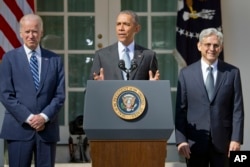A new survey in the United States shows that nearly two-thirds of Americans agree with Democrats' demands that the Republican-controlled Senate ought to hold hearings and vote on President Barack Obama's nominee to the Supreme Court, but that for many voters, the dispute is not that big of an issue.
The Associated Press-GfK poll released Wednesday found that only about 1 in 5 voters was closely following the Washington dispute over Obama's nomination of appellate court judge Merrick Garland to fill a vacancy on the nine-member court left by the unexpected death in February of Justice Antonin Scalia.
Republican Senate leaders have blocked consideration of Garland, saying the lifetime appointment should be made by the country's next president, whoever is elected in November's national election to replace Obama when he leaves office next January.
Partisan divide
The poll showed that political partisans -- both Democrats and Republicans -- were most interested in whether the Senate considers Garland's nomination, but that only 8 percent of independent voters were paying much attention to the debate.
The appointment of Garland has heightened the already fractious political divide between Democrats and Republicans in Washington, because he could alter the court's philosophical balance.
Scalia was part of a five-member bloc of conservative justices that often held sway over the court's four liberal justices in key rulings.
Garland is widely regarded and viewed as a centrist jurist in his rulings.
Analysts, however, are predicting that if he fills the Supreme Court seat, he would prove to be more liberal than Scalia, thus altering the court's ideological makeup that has held for years.
The poll showed that overall, 64 percent of Americans favor holding hearings on Garland's nomination and -- by a 59 to 36 percent margin -- want him confirmed, should the Senate eventually vote on his nomination.
Hearings
Democrats are pushing, so far unsuccessfully, to force Republicans in the Senate to holding hearings on the nomination and then vote on it.
Groups supporting Garland have staged rallies and used television ads and news conferences to demand action on the nomination, particularly targeting Republican senators facing close re-election contests.
Most Republican lawmakers have rebuffed demands for consideration of the Garland appointment, holding out hope that a Republican president will be elected in November and then make a Supreme Court appointment more to their liking.
Some Republicans, however, have said they will consider acting on Garland's nomination after the presidential election if the leading Democratic contender, former secretary of state Hillary Clinton, is elected, on the theory that she might nominate a justice who is even less to their liking than Garland.






